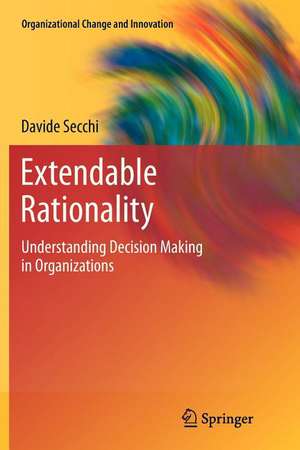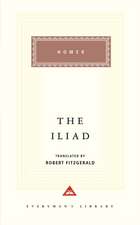Extendable Rationality: Understanding Decision Making in Organizations: Organizational Change and Innovation, cartea 1
Autor Davide Secchien Limba Engleză Paperback – dec 2012
| Toate formatele și edițiile | Preț | Express |
|---|---|---|
| Paperback (1) | 635.01 lei 6-8 săpt. | |
| Springer – dec 2012 | 635.01 lei 6-8 săpt. | |
| Hardback (1) | 641.03 lei 6-8 săpt. | |
| Springer – 28 oct 2010 | 641.03 lei 6-8 săpt. |
Preț: 635.01 lei
Preț vechi: 747.06 lei
-15% Nou
Puncte Express: 953
Preț estimativ în valută:
121.53€ • 126.40$ • 100.33£
121.53€ • 126.40$ • 100.33£
Carte tipărită la comandă
Livrare economică 15-29 aprilie
Preluare comenzi: 021 569.72.76
Specificații
ISBN-13: 9781461427179
ISBN-10: 1461427177
Pagini: 184
Ilustrații: XIX, 161 p.
Dimensiuni: 155 x 235 x 10 mm
Greutate: 0.27 kg
Ediția:2011
Editura: Springer
Colecția Springer
Seria Organizational Change and Innovation
Locul publicării:New York, NY, United States
ISBN-10: 1461427177
Pagini: 184
Ilustrații: XIX, 161 p.
Dimensiuni: 155 x 235 x 10 mm
Greutate: 0.27 kg
Ediția:2011
Editura: Springer
Colecția Springer
Seria Organizational Change and Innovation
Locul publicării:New York, NY, United States
Public țintă
ResearchNotă biografică
Davide Secchi, PhD, is an Assistant Professor of Organizational Behavior at the University of Wisconsin-La Crosse. His research interests include “distributed cognition” and its implications for management; human cognition and decision making; and social responsibility. He received his masters degrees (in venture finance and international finance) and his doctorate from the University of Pavia in Italy, and holds a BS from the University of Cagliari. He presents frequently at conferences and has published widely in scholarly journals and edited volumes, including the Journal of Business Ethics (Springer).
Textul de pe ultima copertă
“How do people make decisions in organizations?” is the question at the core of this book. Do people act rationally? Under what conditions can information and knowledge be shared to improve decision making? Davide Secchi applies concepts and theories from cognitive science, organizational behavior, and social psychology to explore the dynamics of decision making. In particular, he integrates “bounded rationality” (people are only partly rational; they have (a) limited computational capabilities and (b) limited access to information) and “distributed cognition” (knowledge is not confined to an individual, but is distributed across the members of a group) to build upon the pioneering work of Herbert Simon (1916-2001) on rational decision making and contribute fresh insights.This book is divided into two parts. The first part (Chapters 2 to 5) explores how recent studies on biases, prospect theory, heuristics, and emotions provide the so-called “map” of bounded rationality. The second part (Chapter 6 to 8) presents the idea of extendable rationality. In this section, Secchi identifies the limitations of bounded rationality and focuses more heavily on socially-based decision processes and the role of “docility” in teaching, managing, and executing decisions in organizations. The practical implications extend broadly to issues relating to change and innovation, as organizations adapt to evolving market conditions, implementing new systems, and effectively managing limited resources. The final chapter outlines an agenda for future research to help understand the decision making characteristics and capabilities of an organization.
Caracteristici
Applies the concepts of distributed cognition and bounded rationality to explore the dynamics of decision making in organizations Multi-disciplinary, integrating insights from cognitive science, organizational behavior, management, and social psychology One of the first books to put the concept of “docility” at the core of rationality and decision making Includes supplementary material: sn.pub/extras









